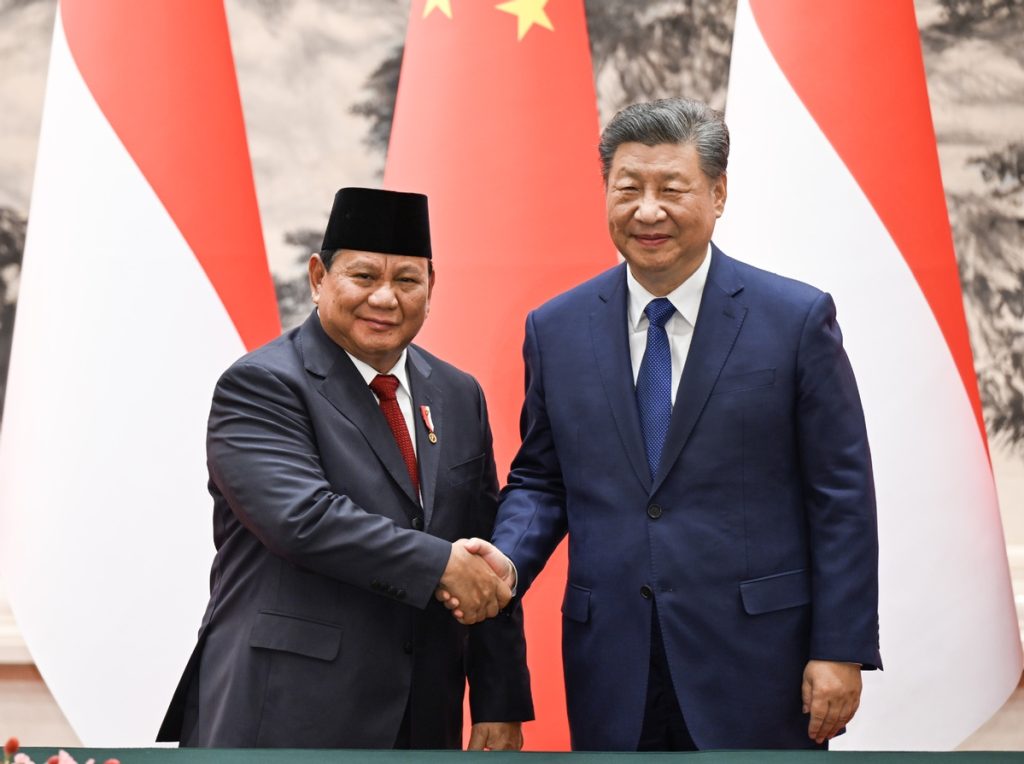Xi holds talks with Indonesian president in Beijing, calling for building a community with a shared future with regional and global influence

Chinese President Xi Jinping held talks with Indonesian President Prabowo Subianto in Beijing on Saturday, expressing the readiness to work with the new Indonesian government to continue promoting self-improvement, solidarity and win-win cooperation among major developing countries.
Prabowo is in China for a state visit at the invitation of Xi.
Xi noted that Prabowo visited China in his first overseas trip right after he was elected in March and chose China as the first country to visit after taking office, which speaks volumes about the great importance he attaches to developing relations with China and demonstrates the high level and strategic nature of China-Indonesia relations, Xinhua News Agency reported.
Xi went on to point out that the adherence to strategic autonomy, mutual trust, mutual assistance, win-win cooperation, fairness and justice represents not only a summary of the experience in developing bilateral ties over the past decades, but also an important principle that should be followed for ensuring the sustained and stable development of bilateral relations in the future.
The two sides also issued a joint statement on Advancing the Comprehensive Strategic Partnership and the China-Indonesia Community with a Shared Future.
Both sides agreed to hold the first meeting of the 2+2 Dialogue Mechanism for Foreign Ministers and Defense Ministers in 2025, which serves as the primary platform to expand high-level strategic communication and political, security and defense cooperation between the two countries, according to the joint statement.
Experts said the partnership between China and Indonesia not only strengthens bilateral ties but also sets a model at regional and global level, highlighting mutual efforts in the drive toward modernization and joint rise of the Global South, with cooperation on security and economic affairs the most notable highlights for this meeting, they added.
"China is willing to work with the new Indonesian government to build on past achievements, promote building a community with a shared future with regional and global influence, and continue to write a new chapter of seeking self-improvement via solidarity, and boosting coordination and mutually beneficial and win-win cooperation among major developing countries," said Xi.
“The partnership between China and Indonesia holds significance not only for bilateral ties but also sets a model on regional and global levels,” Xu Liping, director of the Center for Southeast Asian Studies at the Chinese Academy of Social Sciences, told the Global Times. “The partnership highlights both countries' efforts to advance modernization and strengthen the resilience and rise of major developing nations through South-South cooperation.”
“The message is clear: regardless of shifting international dynamics, the fundamental of friendly cooperation between China and Indonesia remains unshakable,” Xu said.
In addition to reflecting his willingness to strengthen ties with major powers such as China, Prabowo’s choice also underscores that the Southeast Asian nation aspires to play a bigger role on the global stage, said Ma Bo, an associate professor at the School of International Studies at Nanjing University.
Ma believes that the relations between the two countries have entered a period of accelerated development, as Prabowo’s administration, building on the friendly approaches of his predecessor, is likely to strengthen strategic mutual trust with Beijing, especially when both sides share a commitment to regional peace amid recent instability.
Additionally, Indonesia holds high expectations for China’s support in its economic development and is eager to pursue complementary cooperation in areas such as infrastructure and industrial relocation, Ma told the Global Times.
The Jakarta-Bandung High-Speed Railway (HSR), the first HSR in Indonesia and Southeast Asia and a landmark project under the China-proposed Belt and Road Initiative (BRI), celebrated its first year of operation on October 17, having carried over 5.79 million passengers, according to the China State Railway Group Co.
Prabowo served as the minister of defense from October 2019 to October 2024, when he assumed office as the president of the Republic of Indonesia. He was elected for president in March 2024, according to Xinhua News Agency.
Xu said that China and Indonesia have considerable potential for security cooperation in both traditional and non-traditional areas.
In terms of traditional security, the two countries have consistently worked together to maintain regional peace and stability. Take the South China Sea issues, both countries have collaborated to advance the consultations on a Code of Conduct (COC) in the South China Sea.
In the realm of non-traditional security, their cooperation is also extensive, covering areas such as climate change, financial stability, and joint efforts to combat transnational crime, particularly in targeting telecom fraud, Xu told Global Times, adding both sides have conducted effective cooperation in apprehending telecom fraud criminals.
Ma added that in light of the Russia-Ukraine conflict and ongoing war in the Middle East, Indonesia recognizes that regional peace is crucial for its economic development. Prabowo has laid out an ambitious goal of 8 percent annual economic growth during his first term, and reaching this target hinges on securing a stable and peaceful environment in the region, said the expert.
Cooperation on fisheries is a key area of collaboration between the two countries. With Indonesia's rich fisheries resources and China's vast consumer market, their cooperation in this sector is highly complementary and holds significant potential, Xu said.
Home to abundant aquatic resources, Indonesia is aiming to boost its fisheries production capacity via cooperation with China. Xu added that the China-Indonesia Joint Laboratory for Marine Sciences, established last year, and the "Two Countries, Two Parks" project between the two sides, which includes jointly building the fisheries industry supply chain, are proof of the mutually beneficial cooperation between the two countries' marine sectors.